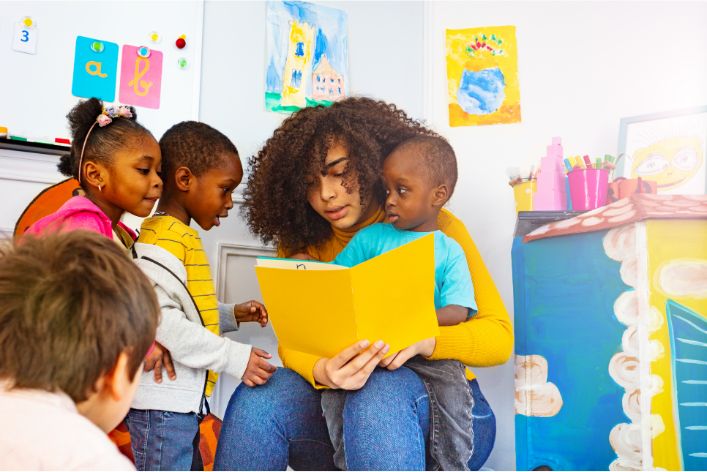Introduction
People have passed down folk tales, which are traditional stories, from generation to generation. These stories vary across different cultures, providing insights into the beliefs, traditions, and moral values of a society.
Exploring folk tales with family members is a unique way of preserving cultural heritage and creating lasting memories. Stories told in an interactive and engaging manner, enhance bonding and promote good communication.
Additionally, folk tales offer educational benefits to children. They enhance their understanding of the world around them and teach valuable life lessons like kindness, hard work, and honesty.
Furthermore, exploring folk tales provides a sense of pride and identity. It helps children understand their cultural roots and appreciate their uniqueness.
In a nutshell, exploring folk tales of Nigeria as a family is a worthwhile endeavor. It preserves cultural heritage, promotes family bonding, and provides educational and cultural benefits to children. It is essential to encourage the passing down of these stories from generation to generation to preserve our identity and cultural diversity.
Overview of Nigerian Folk Tales
Nigeria is a country with a rich cultural heritage and one of the things that stands out is its folk tales. Nigerian folk tales are a blend of myths, legends, fables, proverbs, and riddles.
Oral tradition and various media forms have transmitted these stories from one generation to another throughout history.
Types of Nigerian Folk Tales
Myths are stories that explain how the world and everything in it came to be. They are usually based on supernatural events and are meant to be accepted as true. An example of a Nigerian myth is the story of how the tortoise got his shell.
Legends are stories that are based on historical events or real-life people. They are usually exaggerated for effect, and their purpose is to entertain while teaching a lesson. An example of a Nigerian legend is the story of Queen Amina of Zazzau.
Fables are stories that teach a moral lesson through the actions of animals. They are meant to be enjoyed but also serve a didactic purpose. An example of a Nigerian fable is the story of the hare and the tortoise.
Proverbs are concise and memorable sayings that express a lesson or truth. They are often used in conversation and serve as a reminder of cultural values. An example of a Nigerian proverb is “when the mouse laughs at the cat, there is a hole nearby.”
Riddles entertain and promote critical thinking by challenging individuals to solve puzzles through careful thought and attention to detail. An example of a Nigerian riddle asks, “What am I? I am taken from a mine, enclosed in a wooden case, never released, yet used by almost every man.”
Brief History and Cultural Significance
Nigerian folk tales, passed down through generations, preserve history, teach moral lessons, and transmit societal values. They entertained communities at gatherings, festivals, and special occasions, predating modern technology.
Nigerian folk tales represent the customs, beliefs, and traditions of the people. They provide insight into the Nigerian way of life, customs, history, and beliefs.
They are an essential part of Nigerian culture and serve as a reminder of who the people are and where they came from.
Parenting Made Just for You
Get personalized Parenting Solutions tailored to your child’s needs. Transform your parenting journey with expert guidance in 1-3 days.
Get StartedIn essence, exploring Nigerian folk tales is an excellent way to connect with the rich cultural heritage of Nigeria. These stories are entertaining and serve as a means of preserving history and passing on values and wisdom to generations.
Read: Family Friendly Festivals in Nigeria: A Yearly Guide
Benefits of Engaging in Folk Tales
Folk tales are stories passed down through generations and can be found in different cultures around the world. In Nigeria, folk tales hold great importance and provide valuable benefits for both children and adults.
Benefits for Children
- Improvement in language skills: Listening and engaging in folk tales can help in the development of a child’s language skills, improving their vocabulary, comprehension, and communication abilities.
- Cognitive development: Folk tales can also aid in a child’s cognitive development, enhancing their reasoning, problem-solving, and critical thinking skills.
- Boost creativity: Folk tales are often filled with imaginative characters and settings, sparking a child’s creativity and encouraging them to come up with their own creative ideas and stories.
- Understanding empathy: Folk tales often teach valuable life lessons and can help children understand empathy, kindness, and other positive character traits.
- Develop cultural awareness: Listening to folk tales can help children learn about their cultural heritage, traditions, and customs.
Benefits for Adults
- Relaxation: Engaging in folk tales can be a great form of relaxation, providing an escape from daily stressors and helping to calm the mind and body.
- Preservation of culture: Listening and sharing folk tales can help in the preservation of Nigerian cultural heritage, ensuring that these stories are passed down from generation to generation.
- Strengthen family bonds: Sharing folk tales as a family can provide an opportunity for bonding and strengthening family relationships and connections.
- Sparks social connections: Sharing folk tales can also help in developing social connections, promoting communication and unification with others.
- Encourages lifelong learning: Engaging in folk tales can inspire adult listeners to continue learning about their culture, history, and the wider world.
In summary, engaging in folk tales provides numerous benefits for both children and adults. From improving language skills and enhancing critical thinking to preserving culture and strengthening family bonds, these stories continue to offer value and remain a vital part of Nigeria’s rich cultural heritage.
Read: Top Nigerian Books for Children to Spark Imagination

Practical Tips for Engaging in Folk Tales as a Family
Looking for a fun and engaging way to bond with your family?
Look no further than exploring the rich abundance of folk tales from Nigeria! Generations have passed down these traditional stories, providing valuable lessons and insights into Nigerian culture and history.
Here are some practical tips for engaging in folk tales as a family:
Emphasize on Interactive Storytelling
One of the best ways to engage with folk tales is to approach them as a two-way conversation. Encourage your kids to ask questions and offer their own interpretations of the stories. You can also act out different characters or use puppets to bring the stories to life.
Tips for Selecting Appropriate Folk Tales for Various Age Groups
It’s important to choose folk tales that are appropriate for your child’s age group.
Younger children may enjoy simple stories with clear morals, while older children may enjoy more complex narratives with multiple characters and plot twists.
Ask for recommendations from your local library or do some research online to find the best folk tales for your family.
Suggestions for Incorporating Nigerian Folk Tales into Everyday Life
Once you’ve found a few folk tales that your family enjoys, try incorporating them into your daily routine. You can use them as bedtime stories, conversation starters, or even as inspiration for art projects and crafts. Encourage your children to retell the stories in their own words or come up with their own versions.
Generally, exploring Nigerian folk tales is a wonderful way to spend quality time with your family while also learning about a rich cultural heritage.
Unveil the Perfect Name that Tells Your Family's Story
Let us help you find a name that embodies your family's values, traditions, and dreams. Our personalized consultation weaves cultural insights to create a name that's uniquely yours.
Get StartedBy emphasizing interactive storytelling, selecting appropriate tales for different age groups, and incorporating the tales into your daily routine, you can create lasting memories and instill important values in your children. So what are you waiting for? Start exploring the world of Nigerian folk tales today!
Read: Tips for Planning a Family Beach Day in Nigeria
Examples of Nigerian Folk Tales
- “The Tortoise and the Birds” – In this story, the tortoise tricks the birds into giving him feathers so he can fly, but he ultimately falls to his demise when he becomes too greedy. The tale teaches a lesson on the dangers of greed.
- “The Elephant and the Ants” – The elephant thinks he is too big to be bothered by the tiny ants, but they work together and bring him down. This story emphasizes the importance of teamwork and unity.
- “The Sun and the Moon” – The sun and the moon get into an argument about who is more powerful, and they both try to prove it by shining brighter and brighter until they both disappear. The story teaches a lesson on the importance of compromise and humility.
How Each Folk Tale Can Teach Valuable Lessons
Each of these folk tales, and many more in Nigerian tradition, have valuable lessons to teach both children and adults. These stories are often used in interactive family time to pass on these lessons and entertain all members of the family.
Listening and learning from folk tales enables children to deepen their understanding of values like honesty, kindness, and perseverance. The stories ignite their imaginations and creativity, inspiring them to create their own stories and think critically.
Folk tales remind adults to stay grounded in their values and continually work on self-improvement. These stories tackle themes such as social justice, family dynamics, and personal growth, which hold relevance in today’s world.
Exploring Nigerian folk tales is a wonderful way to connect with one’s heritage, gain insight into cultural values, and bond with family members through interactive storytelling.
As we continue to navigate a world driven by technology, it is important to remember the power and beauty of traditional practices like sharing folk tales.
Read: Music Lessons for Kids in Nigeria: A Parent’s Guide
Conclusion
Engaging in Nigerian folk tales as a family is an essential activity that can help to strengthen family bonds, promote cultural awareness and instill values in children.
The exploration of Nigerian folk tales is an important step in preserving and celebrating our cultural heritage. With the vast array of stories available, families can easily find tales that both entertain and educate their children.
By making folk-tale exploration a regular activity within the family, parents can impart valuable life lessons while having fun with their children. It is also an excellent opportunity for children to learn about their ancestry and embrace their culture.
Therefore, we encourage families to make folk tale exploration a regular activity. By doing so, they are contributing to the preservation of our culture and passing it along to future generations.
Most importantly, exploring Nigerian folk tales as a family is an enjoyable and educational activity that we should all embrace.
By doing this, we can help to preserve our cultural heritage while strengthening family bonds and instilling values in our children. Let’s make it a regular activity!




